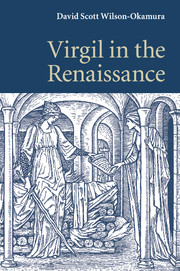Book contents
- Frontmatter
- Dedication
- Contents
- Illustrations
- Acknowledgements
- Texts and abbreviations
- Introduction
- Part I Publication
- Part II Reputation
- Part III Interpretation
- Chapter 5 Virgil’s Odyssey
- Chapter 6 Virgil’s Iliad
- Epilogue
- Appendix A Virgil commentaries in Latin editions, 1469–1599
- Appendix B Virgil commentaries ranked by number of printings
- Index
- References
Epilogue
from Part III - Interpretation
Published online by Cambridge University Press: 05 March 2014
- Frontmatter
- Dedication
- Contents
- Illustrations
- Acknowledgements
- Texts and abbreviations
- Introduction
- Part I Publication
- Part II Reputation
- Part III Interpretation
- Chapter 5 Virgil’s Odyssey
- Chapter 6 Virgil’s Iliad
- Epilogue
- Appendix A Virgil commentaries in Latin editions, 1469–1599
- Appendix B Virgil commentaries ranked by number of printings
- Index
- References
Summary
If you take from Virgil his language and metre, what do you leave him?
S. T. Coleridge, Table Talk (May 8, 1824)One of the themes of this book has been continuity: with ancient commentators, especially Macrobius and Servius; with medieval commentators; and with the medieval conception of Virgil as a love poet. The other has been modernity. The Renaissance was conscious of itself as something new, and sometimes the claims were true. They did learn to read Greek again, their Latin did sound more like the language of Cicero, and they did discover manuscripts that were not widely available in the Middle Ages (such as Donatus’ life of Virgil). To be modern in this sense is to be post-medieval. Other times, modern means Christian or post-classical. Vegio’s supplement was modern in both senses. The story it tells is a medieval one and is modern, therefore, in the sense of being post-classical. There were differences, of course. Compared with Eneas, Vegio’s poem places more emphasis on the marriage ceremony and the banquet afterward. Also, the love story in Vegio is told primarily from Aeneas’ point of view, rather than Lavinia’s. But this is not what made Vegio a Renaissance author. Rather, what made Vegio modern in the sense of being post-medieval was his Latin.
Ruskin mocked the Renaissance for “its worldliness, inconsistency, pride, hypocrisy, ignorance of itself, love of art, of luxury, and of good Latin.” He was right about the Latin. Today, the Renaissance is understood to have begun as an attempt to write, first, Latin verse and, later, Latin prose in a purer, more classical style: i.e., in the style of Cicero and Virgil rather than, say, Duns Scotus and Hrabanus Maurus. We don’t like to call it this, but it was a kind of secular fundamentalism, where fundamentalism does not necessarily mean “anti-modern ignorance” but “a return to first principles through careful study of original source-texts.” Vegio was part of this movement. The Latin of his Aeneid sequel is not perfectly classical, but it is more classical than, say, Dante’s eclogues, or even Petrarch’s.
- Type
- Chapter
- Information
- Virgil in the Renaissance , pp. 248 - 251Publisher: Cambridge University PressPrint publication year: 2010



